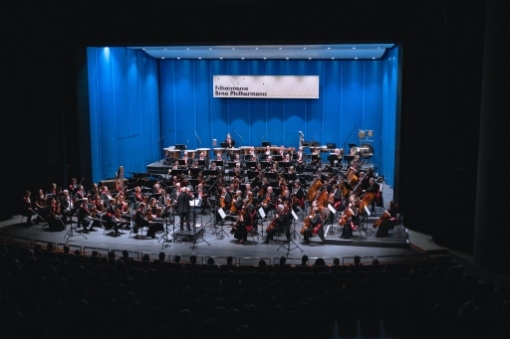With Thursday's concert entitled Bruckneriana, the Brno Philharmonic under the direction of Principal Conductor Dennis Russell Davies launched the subscription series Philharmonia in the Theatre I. The orchestra performed works by Anton Bruckner and Stanislaw Skrowaczewski, a Polish-American conductor and composer who devoted his life's work to Bruckner. Performers wearing crimson sashes with the inscription "Playing forte!” appeared in front of the audience, joining the "Let's not let culture die” initiative, which draws attention to the underfunding of culture and opposes the government's plan to invest just 0.64% of the state budget into culture next year, moving further and further away from its promise to spend at least 1%.
The first half of the evening was dedicated to Passacaglia immaginarii (1996) by Polish-American composer and conductor Stanislaw Skrowaczewski (1923-2017), who would have celebrated his 100th birthday on October 3 this year. The work, for which the author was nominated for the Pulitzer Prize, is built, as its title suggests, on the principles of the musical form of passacaglia, which originated in Spain at the beginning of the 17th century. The piece is characterised by a basso ostinato theme (which is later changed), over which more and more musical inventions take place. The composition featured several technically demanding elements in the form of abrupt changes in dynamics or sudden rhythmically demanding sections by one or more instruments. The Brno Philharmonic under Dennis Russell Davies, however, coped with all these tricky issues, and its performance brilliantly showcased the strongest aspect of this work - the orchestra's ability to utilise varying tone and sound in their playing. At the moment when a melodic line was prescribed to the players, but without a certain tempo and each musician playing slightly differently, a mass of indeterminate sound was heaped on the audience, but it was very effective and blended perfectly into the composition.
After the intermission came Symphony No.6 in A major (1879-1881) by the Austrian composer Anton Bruckner (1824-1896). Before the orchestra started playing, a mobile phone rang in the audience, to which the conductor responded with a humorous grimace and some of the musicians even repeated the ringing melody on their instruments. The faux pas was thus turned into a joke, which momentarily lightened the atmosphere before the demanding, almost hour-long composition. Bruckner's "Sixth" belongs to the so-called major tetralogy, which consists of Symphonies 4 to 7. The major keys are rather unusual for the composer. The work is characterised by a very sophisticated, in some places even "Wagnerian" instrumentation, which he combined with a very clear form (the only movement not written in sonata form is the concluding Finale).
The composer did not have a chance to hear the whole symphony, as only two movements were performed during his lifetime, and even today it is one of the lesser-performed symphonies. The great interpretive difficulty of the work may have something to do with this. A typical "Brucknerian" rhythm already appears in the first movement in the form of a group of eighths and sixteenths followed by a tuplet. It gradually permeates the entire composition, but it is most prominent in the first movement. The orchestra was a bit out of tune in the places where this rhythm appeared. There were also a few points in the first movement where the gestures did not always fit well. However, this gradually improved during the second movement, and in the third movement, the Scherzo, the orchestra under Davies' direction was completely free of these ailments. The concluding Finale was in a similarly successful spirit, closing the whole symphony very nicely with its celebratory character. As in the first piece of the evening, the conductor was able to work very well with the orchestra, especially in the gradual and abrupt dynamic changes and various alterations of tempo. Except for the few criticisms mentioned above, the concert was very successful and paid the composers the tribute they certainly deserve. The Brno Philharmonic Orchestra brought the audience a great experience, which they returned with a powerful ovation.
Programme:
Stanislaw Skrowaczewski: Passacaglia immaginaria
Anton Bruckner: Symphony No. 6 in A major
Brno Philharmonic
conductor: Dennis Russell Davies
Janáček Theatre, Thursday 23.11.2023, 7 pm
































No comment added yet..